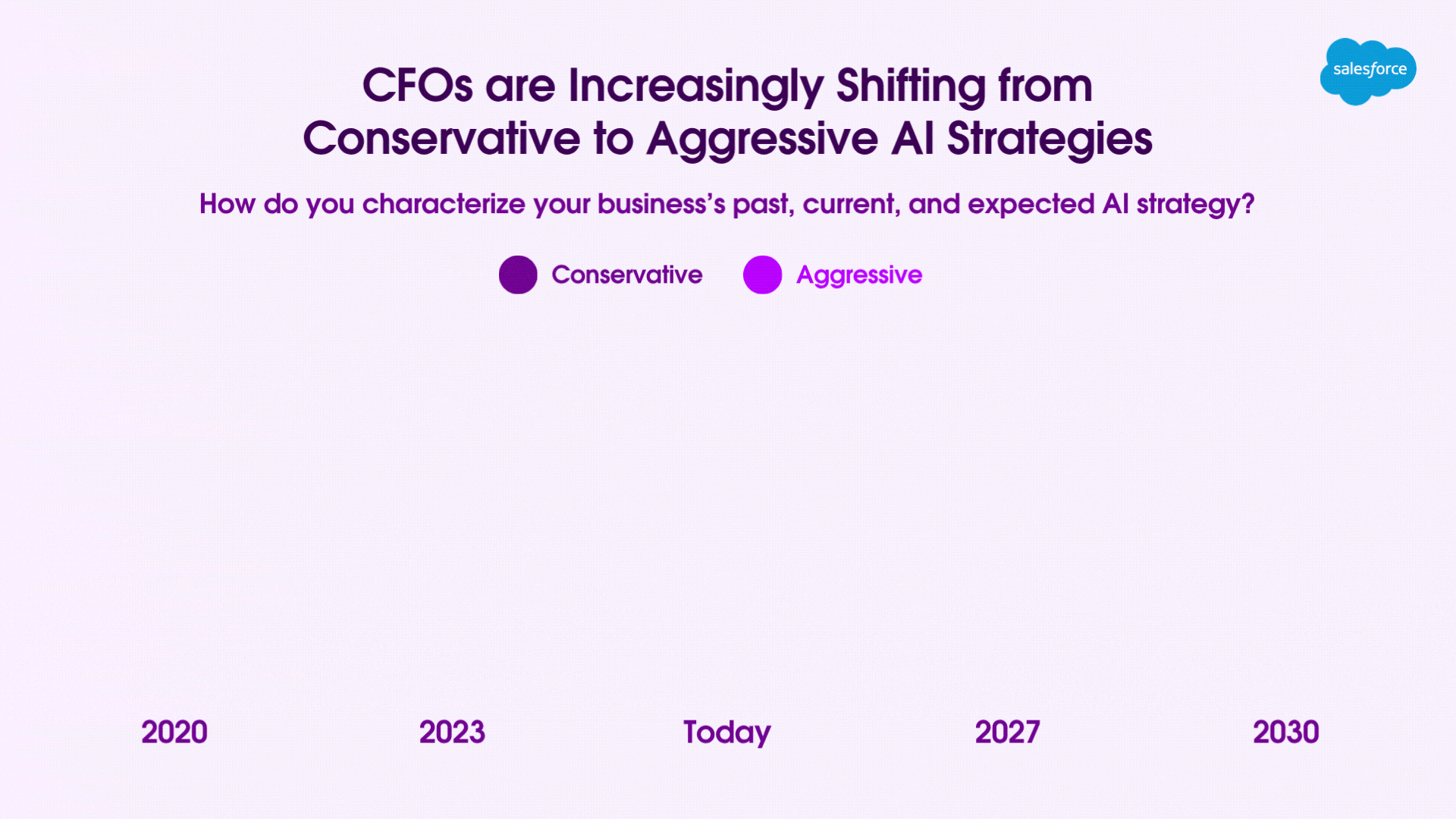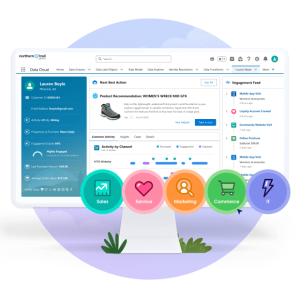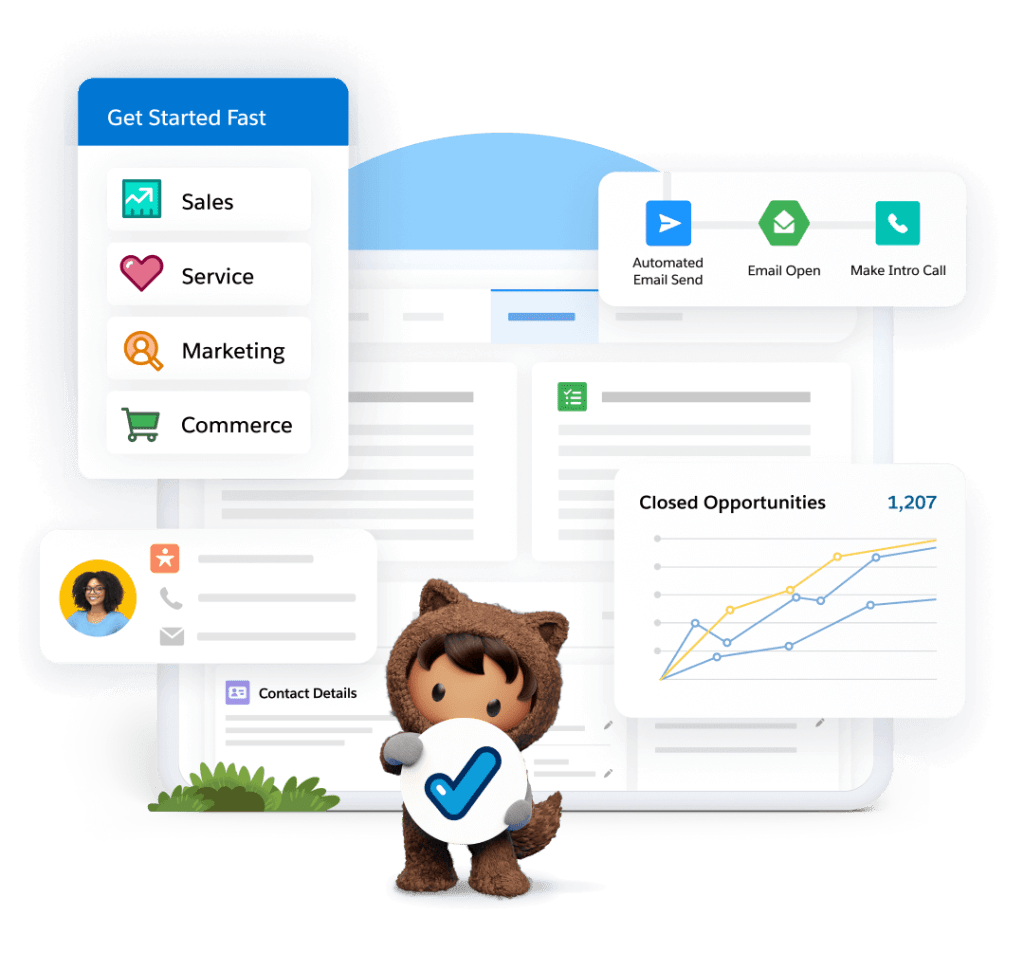Ten years ago, most chief financial officers (CFOs) were focused on financial reporting and compliance. Today, the role looks different.
Rising costs, new regulations, and constant disruption mean finance leaders now spend their time strategising and leading digital transformation. In fact, 82% say their responsibilities have expanded in the past five years.
In this article, we’ll look at how the CFO role is changing, the challenges that come with it, and how technology like Salesforce can help finance leaders stay ahead.
Explore the Connected Financial Services Report
Get insights from 9,500 consumers worldwide on how AI is reshaping trust, service, and expectations in the financial sector.



The evolving role of the CFO
The CFO role used to be almost entirely about managing the company’s money. Today, it spans nearly every part of the business. CFOs help decide how the company grows, choose which technologies to invest in, make sure sustainability goals are met, and support hiring decisions.
This means that CFOs today are not only money managers, but they’re also:
- Strategic advisors: Shaping growth and M&A decisions
- Technology leaders: Leading digital adoption, particularly with AI
- Sustainability champions: Overseeing ESG reporting
- Talent partners: Supporting workforce strategy
In fact, 65% of CFOs say they are under pressure to accelerate returns from technology investments, and 93% expect to be more involved in organisational strategy over the next three years.This pressure is changing how CFOs approach new technology. Only a few years ago, most CFOs were cautious about AI, with 70% describing their strategy as conservative in 2020. That number has now flipped, and today only 4% still say they take a conservative approach, with the majority planning for aggressive adoption in the years ahead.

Source: Salesforce research, 261 CFOs share their priorities
How technology empowers the modern CFO
Modern tools help CFOs see how the business is performing right now, use AI to make more accurate forecasts, handle compliance automatically so audits are simpler, and stay connected with other departments.
More than half of CFOs (61%) say that AI agents are changing how they think about their ROI from technology. In the past, the return on investment was typically measured by quick results such as cutting costs or boosting profit.
Now, finance leaders are looking at a bigger picture, including gains like better decision-making, stronger compliance, productivity, and long-term revenue growth. This shift is accelerating the number of finance teams choosing to use AI, with 58% already adopting it in 2024 compared to only 37% the year before.
This is where Salesforce Financial Cloud stands out. Traditional finance software options only offer simple accounting and reporting. However, as a CFO, you need to understand how sales performance affects cash flow, how customer trends shape revenue forecasts, and how ESG reporting ties into compliance and risk. Salesforce brings these areas together on one connected platform so you can track revenue in real time, model different growth scenarios, and ensure your data is audit-ready.
Experience Salesforce with an interactive demo.
Get hands on with our products and explore real use cases and solutions built for agentic enterprises.

7 Salesforce solutions for the modern CFO
Every CFO faces a mixture of pressures. Below, we’ll look at seven core areas where Salesforce can help CFOs lead with control and confidence.
- Enhance data-driven decision-making and analytics
- Drive efficiency through automation and digital transformation
- Revolutionise planning and forecasting
- Optimise cash flow and revenue management
- Strengthen compliance and risk management
- Power growth and expansion
- Enhancing collaboration and agility
1. Enhance data-driven decision-making and analytics
One of the biggest challenges CFOs face is bringing together data from across the business and making sense of it. Finance leaders need more than the final numbers. They need to see how sales performance, customer behaviour, and operational trends are contributing to results.
When all you can see are disconnected spreadsheets or siloed systems, this process is slow, unreliable, and often leaves gaps in your understanding.
Salesforce Data Cloud unifies information from across the business, giving CFOs a single source of truth. Paired with Tableau’s advanced analytics, finance teams can spot trends, run deeper analysis, and share insights with executives in real time. This combination makes it easier to make strategic decisions backed by accurate data.
2. Drive efficiency through automation and digital transformation
Manual finance work slows everything down. Reconciliations, reporting, and other repetitive tasks often take hours without adding much real value. For CFOs, this means higher costs, slower decision-making, and less time for meaningful analysis.
Agentforce brings AI automation to routine finance processes. When combined with Salesforce CRM, it allows you to build custom workflows that match the needs of your business. Slack adds another layer by keeping finance connected with other departments in real time, so collaboration becomes an easy part of everyday work.
Together, these tools cut down manual work, improve productivity, and speed up decision cycles. In fact, 75% of CFOs in APAC believe AI agents will not only reduce costs but also generate new revenue through transforming how their organisations operate.
3. Revolutionise planning and forecasting
Forecasting can be an almost impossible task when you have too many moving parts to manage. Pair this with static spreadsheets and outdated reports, and it’s hard to keep up.
Relying on information you don’t even fully trust makes it difficult to report up with confidence, and you risk steering the business in the wrong direction. To support more accurate decision-making, you need real-time visibility and the ability to test scenarios before you commit to big decisions.
With Salesforce CRM and Tableau, you’ll be able to see live performance data, use predictive AI to understand where the business is heading, and model different outcomes in seconds. Instead of waiting for your team to build a report that might be out-of-date by the time it’s delivered, you’ll get insights instantly that you can share across the business.
4. Optimise cash flow and revenue management
We know that cash flow is one of the areas you watch the most closely, but it can also be one of the hardest to manage. Between complex billing cycles, subscription models, and recurring revenue streams, it’s easy to lose sight of your true cash flow.
Salesforce Revenue Cloud helps simplify this by automating CPQ, billing, and subscription processes. Instead of chasing data across multiple systems, you can see exactly where money is coming in and going out and maintain a consistent cash flow.
5. Strengthen compliance and risk management
Meeting compliance requirements has become one of the most complex parts of the CFO role. ESG reporting is no longer optional in Australia. As new regulations continue to emerge, the expectation is that finance teams will always be audit-ready.
At the same time, you’re responsible for managing enterprise risk and protecting customer data, fully aware that even one failure could trigger financial, regulatory, or reputational damage. It’s a heavy responsibility, especially when it’s not an area many CFOs have been formally trained in.
Research from Gartner indicates that cybersecurity should be treated as a business decision. Salesforce helps you meet these demands in two ways. Net Zero Cloud makes ESG and compliance reporting simpler, while Salesforce builds in enterprise-grade security with ISO, SOC, and GDPR certifications. This means you can trust the accuracy of your reporting while reducing exposure to cyber risk.
6. Power growth and expansion
Supporting growth has always been a core part of the CFO’s role, but today it’s more complex. Growing the business, launching new products, or entering new markets all require finance to keep pace with rapid change while maintaining oversight of costs and risks. Without the right tools, it’s easy for expansion to outgrow the current systems you rely on.
Using Sales Cloud gives you visibility into how new markets and products are performing, while Commerce Cloud connects your financial data with customer and sales activity in real time. Together, they make it possible to track all your revenue streams and align your finances with wider business strategies.
7. Enhancing collaboration and agility
Your role doesn’t exist in isolation. To deliver results, you need to work closely with the wider C-suite. However, collaboration often breaks down when finance data is locked away in reports or shared too late to shape decisions.
With Slack integrated into Salesforce, you can embed financial data directly into where teams are having discussions. That means your colleagues see the same numbers you do; so, whether you’re reviewing forecasts, adjusting budgets, or planning where to invest next, everyone has the same context.
Case studies: Salesforce in action
CFOs across industries are using Salesforce to save time, improve accuracy, and guide strategy. Here are two success stories to inspire you.
ANZ: Using Agentic AI for forecasting
ANZ is one of the largest banks in Australia and New Zealand, serving millions of customers. Like many finance leaders, ANZ executives were under pressure from boards and shareholders to demonstrate clear business value from AI.
ANZ turned to Salesforce to deploy Agentforce and bring agentic AI into its core finance and customer processes. This implementation made it possible to automate routine tasks, integrate data across departments, and apply AI to areas such as forecasting and decision-making.
Since adopting Agentforce, they have reported improvements in forecasting accuracy and faster reporting cycles. We also found that 98% of ANZ C-suite leaders say they now trust AI to handle at least one of their business tasks entirely on its own.
Vicinity Centres: Automating tenant reporting and leasing
Vicinity Centres is one of Australia’s largest retail property groups, with $22 billion in assets across 61 shopping centres. Its finance team was spending huge amounts of time on manual reporting and payment reconciliation. They were also relying on outdated systems to manage short-term, pop-up leasing and advertising space within their centres.
The company worked with Salesforce to implement the Salesforce Platform with Sales Cloud. This upgrade gave them one connected system for booking, invoicing, and reporting. Since this change, Vicinity has automated tenant reporting and payment reconciliation, saving more than 1,500 hours each year. On top of this, their finance leaders now have faster access to accurate data and clearer oversight of performance.
Scale quickly and efficiently with Starter Suite.
Get marketing, sales, service and commerce tools all in one easy-to-use suite. Starter is a simplified CRM designed to help growing businesses find new leads, win more deals and keep customers happy.

Get future-ready with Salesforce
We know the role of a CFO now stretches across every part of the business. Some days can feel like you’re expected to be a strategist, a technologist, a sustainability officer, and a people manager, all while doing your day job. That’s a heavy mix of responsibilities. To do all these jobs in your work week, you need tools that connect the dots between finance, sales, customers, and compliance.
Salesforce gives you that connection. With one platform bringing together real-time data, AI forecasting, and automation, you can see the full picture of your business and make decisions with confidence. If you’d like to see it in action, you can watch a demo or try it for free.
FAQs
What is financial planning in business?
Financial planning involves setting goals, creating a business plan, managing accounts receivable, and enforcing financial controls. For CFOs, it connects financial and operating performance with corporate governance, human resources, and social impact.
How does a Master of Business Administration (MBA) prepare future CFOs?
An MBA gives finance leaders broad business administration and management skills, helping them step into the chief financial officer (CFO) role with stronger strategy, leadership, and digital transformation expertise.
What is the role of a chief financial officer (CFO) today?
A CFO is no longer just a financial manager. Modern CFOs and their teams lead financial planning and analysis, oversee financial operations, deliver insights to the board of directors, and guide technology adoption like cloud ERP and machine learning.


















